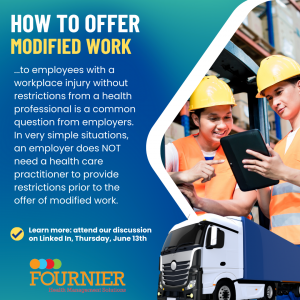How to offer modified work to employees with a workplace injury without restrictions from a health professional is a common question from employers. In very simple situations, which will be explained during our discussion on Linkedin Thursday, June 13, an employer does NOT need a health care practitioner to provide restrictions prior to the offer of modified work.
I know! I know! Employers are baffled by this comment.
The rhetorical comment when I tell employers this, is usually, ‘but we aren’t health care practitioners. How do you expect us to know?’
It isn’t a complicated process. Let me explain.
If you hurt your back at home, what type of work or activities would your back injury prevent you from performing? For some reason, being at home when injured seems to feel different than being injured at work, but it’s not.
Here is a list of functional limitations that a back injury would prevent you from performing that would be prudent to include when offering modified work in the workplace.
- No lifting
- No pushing or pulling
- No carrying
- No prolonged standing
- The ability to sit, stand and walk as needed
- The ability to self-pace your work
- Taking short breaks when needed
- Provide a stool for low level work
- No repetitive trunk movement
- No overhead work
- No ladder use
- No twisting of the trunk
These are the basic back injury restrictions you would use for all back injuries, in simple cases for modified work. This would be adjusted as the employee starts to recover.
After this, when and if you do receive a Form 8 or FAF, you can adjust the above restrictions based on what the health practitioner has indicated, and/or amend those above based on their opinion. Chances are, the practitioner will recommend the same or very similar as those indicated above. Make sure your offer is in writing – on paper, email or text – all work just fine for WSIB.
WSIB in Ontario would support this offer of modified work for back injuries with a specific job title that provides the employee with suitable and meaningful work. Remember to indicate the specific job title. Keeping the job title vague is a problem if you want WSIB to support you.
Also, when you offer modified work to injured workers, the goal is not to coerce anyone to take the offer, but instead you want injured workers to cooperate in the offer of modified work. If the worker is refusing, ask why. It could be one of the jobs you are offering, doesn’t appear to be suitable to them, and I would strongly suggest that you remove it from the list rather than insisting it’s suitable.
Remember cooperation from both sides is necessary and your goal is to help the injured worker remain at work. Working together is the key to success. If your case is more complicated, come to our session on Thursday, and let us know how we can further help you with your offer of modified work.
Book a chat with me and plan to attend our discussion on Linked In, Thursday, June 13th!







Leave A Comment